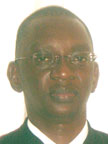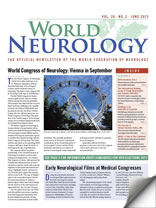 I am professor of Neurology, Epileptology and Neurosciences at the University Hospital of Dakar, Senegal. I am 54 years old; graduated MD in 1988 in Dakar and specialized in neurology (Universities of Toulouse, France and Dakar, Senegal). I obtained my PhD in neurobiology in Limoges, France, in 1995 and served as assistant professor of Michel Dumas, at the University Hospital of Limoges, for four years. I also have expertise in public health and health promotion (University of Nancy, France).
I am professor of Neurology, Epileptology and Neurosciences at the University Hospital of Dakar, Senegal. I am 54 years old; graduated MD in 1988 in Dakar and specialized in neurology (Universities of Toulouse, France and Dakar, Senegal). I obtained my PhD in neurobiology in Limoges, France, in 1995 and served as assistant professor of Michel Dumas, at the University Hospital of Limoges, for four years. I also have expertise in public health and health promotion (University of Nancy, France).
I was promoted to the position of professor of Medicine in 1996 after a continental contest and was ranked first. I have co-chaired with Professor Johan Aarli, father of the “Africa Initiative” of the World Federation of Neurology. I am chairing it currently.
The participation in several scientific conventions in 53 countries across the world and having grown in a multicultural, multilingual environment make me a real citizen of the world. All of these experiences have given me an international open vision and approach for global health care and education.
My feet are deeply rooted in the soil of the African continent with its enriching young and promising environment. My brain is dedicated to always try and reach the excellence. My hands are widely open to the world’s diversity and infinite opportunities.
Son of a teacher, I am convinced that education and training are the keys for bridging any gap and go beyond the borders raised by economic, environmental and human factors. A specific characteristic of my personality is to gather people around important goals; try to obtain consensus when there are antagonisms. However, when the time comes for making a decision, I am able do so in a gentle and balanced way. With these qualities and your support, I will carry out the WFN’s vision: “fostering quality neurology and brain health worldwide.”
Achievements
Over two decades, I have been closely involved in promoting training in neurology and neurosciences, collaborative researches and initiatives for improving the availability and quality of care for neglected populations. Since 2000, I have been responsible for post-graduate education of junior medical staff and trainees coming from 14 African countries, by setting up training and specialization certificate in neurology in the University of Dakar. This academic course enrolls 25 students from Africa annually. We are proud that over 12 years, we have many graduates who are now serving as neurology specialists in their countries, including, for some of them, the first neurologist ever. In 2010, I set up, at Dakar, the first University Diploma of Epileptology in Sub-Saharan Africa. Twenty-nine trainees from eight African countries have completed this brand new course. I am the past-chairman of the Society of Neuroscientists of Africa, which aims to promote clinical and basic neurosciences across the continent.
Before deciding on priorities, one has to know facts. I set about doing this by creating the Neuro-Staff Africa Directory, which is contributing to improve our communication with the world. The data are open to all, for the first time, an opportunity to have the contact of any individual working in Africa in clinical, surgical and basic neurosciences and psychiatry (names, telephones, e-mails as well as fields of interest).
In terms of clinical care, I continue to carry a large clinical load by consulting 4,000 patients per year, from Senegal, international institutions located in Dakar and neighboring countries. Very often and in very difficult situations, my team and I travel to rural areas for care delivery and training via two innovative initiatives: Neuro-Caravans and Caravans for Epilepsy. I have created these concepts, which entail a two-day session of consulting on a large number of people, training health staff, meeting community leaders and caring for patients residing far from capital cities in resources-limited areas. Since May 2005, we have applied these innovative public health methodologies for contributing and reducing the neurodiagnostic and treatment gap. And it works.
Every year, I lecture for 450 medical students, postgraduate trainees and nurses. The fact that I have intervened on local and international media for health education and counseling requires a sense of public responsibility and dedication. The fields I have emphasized over the years is how to better help people with neurological diseases, raise awareness and develop capacity building, such as medical education in mass media, epilepsy, poliomyelitis and measles eradication in Africa.
As WHO consultant, I have gathered patients, families and health and social professionals to set up the Senegalese League Against Epilepsy (ILEA). In my roles as founder and current president, I have contributed to raise awareness among the general population, and community leaders. This league is a recognized leader by WHO, (ILAE) and International Bureau for Epilepsy (IBE), which awarded me in 2001 the title of Ambassador for Epilepsy. We have contributed in setting up and chairing the first Commission on African Affairs of the ILAE.
I have played a key role in the Global Campaign against Epilepsy organizing in Senegal the first Demonstration Project in Africa. I have been the coordinator and main author of the first WHO advocacy report on “Epilepsy in the WHO African Region: Bridging the Gap.” This advocacy and policy document for Africa intends to raise awareness, fight against taboos and discrimination toward people with epilepsy and reduce the burden of their condition. We train doctors and paramedics in Dakar and in the region to better diagnose seizures and treat them. Schoolteachers also have been trained on this common disorder among the young, which leads to many cases of school withdrawal due to ignorance. We have set up a Cheap Drug Bank as in the model I visited in Chile.
I also have been the convener of several international scientific meetings in Dakar and elsewhere. One of the major outcomes has been the African Declaration against Epilepsy, which has been proclaimed in May 2000.
Author of more than 300 scientific communications and publications, I have been honored to be a co-author of WFN Handbooks on Public Health and WFN Education Committee’s Seminars and also Pedley and Engel’s Epilepsy Textbook.
I keep abreast with the latest developments in my fields by undertaking study and professional visits to worldwide renowned institutions and was able to build partnerships with medical services such as: UCLA, McGill, Heemstede, Tokushima, and several institutions in France, Pan-Arab Union and in Africa.
What Would I Contribute?
As I see it, the way the WFN should operate is through mobility and partnership. Time has really come for the “South,” particularly Africa, to reach that level of responsibility in World Neurology governance. Not only for sympathy, but because it would have a tremendous impact on projects of implementing world-class neurology in developing countries. It also would strengthen the health policies for noncommunicable diseases, which are dramatically increasing in terms of morbidity and mortality in the “South.” The rainbow light must touch the WFN. As a WFN Trustee, my mission statement is to bring into action my years of diverse and rich experience, enforced by an ability to overcome any kind of obstacles. I will share with the member societies, particularly from the developing world, concrete success stories and facts. My origins are from the South, namely Africa, but I will be dedicated to the world.
I am running for a position of WFN Trustee and in order to contribute in reaching these goals, my main and only concerns are:
• A world where neurology contributes to human health management and sustainable improvement in every country
• Clear-cut, efficient cooperation and exchanges between developed and developing countries
• Strengthen training opportunities for doctors and paramedics all over the world, with diversified international partnerships
• Make an impact on policies that will take into account raising the burden of noncommunicable diseases all around the world.
The African member states of the WFN are not a majority, therefore my eventual election as a trustee, would and should be global. Every voice in my favor, coming from Europe, Middle-East and Maghreb, Americas, Asia and Oceania should reflect the world in its diversity and its ambition to see WFN survive sustainably, with full understanding of its future, and its balanced, generous vision.
My achievements, if ever consecrated, by a WFN trustee position, should give courage to the new generation of neurologists from everywhere to go beyond any intellectual border and make the world more open with confidence and commitment.
Summary of my Vision
• Ambition for a first-class neurology worldwide
• Friendship and partnership between member societies
• Reinforce regional management
• Integrity in governance
• Commitment to youth in neurosciences
• Attention to any need, especially for low- and middle-income developing countries.
